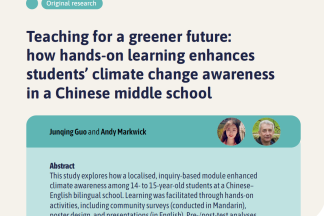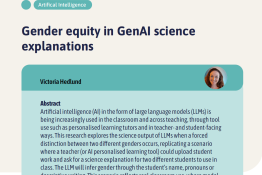Teaching for a greener future: how hands-on learning enhances students’ climate change awareness in a Chinese middle school
Issue 395 | Page 63 | Published Nov 2025
Description
Abstract
This study explores how a localised, inquiry-based module enhanced climate awareness among 14- to 15-year-old students at a Chinese–English bilingual school. Learning was facilitated through hands-on activities, including community surveys (conducted in Mandarin), poster design, and presentations (in English). Pre-/post-test analyses revealed significant improvements in students’ knowledge (d = 2.41–2.87), behavioural intent (+58%), and solution specificity (+220%). Scaffolded language support (bilingual glossaries, CLIL strategies) mitigated second-language barriers. The findings highlight the effectiveness of applying inquiry-based, hands-on pedagogies in developing students’ environmental awareness, and offer practical recommendations for creating actionable pathways for climate education in multilingual contexts.
References
Bexell, M. and Jönsson, K. (2017) Responsibility and the United Nations’ Sustainable Development Goals. Forum for Development Studies, 44(1), 13–29.
Bouillion, L. M. and Gomez, L. M. (2001) Connecting school and community with science learning: real world problems and school–community partnerships as contextual scaffolds. Journal of Research in Science Teaching, 38(8), 878–898.
IPCC (2019) Climate Change and Land: An IPCC special report on climate change. desertification, land degradation, sustainable land management, food security, and greenhouse gas fluxes in terrestrial ecosystems. UN Intergovernmental Panel on Climate Change.
Hattie, J. and Timperley, H. (2007) The power of feedback. Review of Educational Research, 77(1), 81–112.
Hu, S. and Chen, J. (2016) Place-based inter-generational communication on local climate improves adolescents’ perceptions and willingness to mitigate climate change. Climatic Change, 138(3), 425–438.
Kaçar, T., Terzi, R., Arıkan, I. and Kırıkçı, A. C. (2021) The effect of inquiry-based learning on academic success: a meta-analysis study. International Journal of Education and Literacy Studies, 9(2), 15–23.
Kaminskienė, L., Žydžiūnaitė, V., Jurgilė, V. and Ponomarenko, T. (2020) Co-creation of learning: a concept analysis. European Journal of Contemporary Education, 9(2), 337–349.
Le, H., Janssen, J. and Wubbels, T. (2018) Collaborative learning practices: teacher and student perceived obstacles to effective student collaboration. Cambridge Journal of Education, 48(1), 103–122.
Li, C. J. and Monroe, M. C. (2019) Exploring the essential psychological factors in fostering hope concerning climate change. Environmental Education Research, 25(6), 936–954.
Markwick, A. (2023) Educating for sustainability. Journal of Emergent Science, 24, 5–13.
Rieckmann, M., Mindt, L. and Gardiner, S. (2017) Education for Sustainable Development Goals: Learning Objectives. UNESCO Publishing.
Sterling, S. ed. (2010) Sustainability Education: Perspectives and Practice Across Higher Education. Routledge.
Sterling, S. (2011) Transformative learning and sustainability: sketching the conceptual ground. Learning and Teaching in Higher Education, 5(11), 17–33.
Vijayakumari, S. N. and Umashree, D. K. (2017) Effectiveness of cooperative learning and lecture demonstration method on developing ecocentric attitude among secondary school students. Journal on School Educational Technology, 12(3), 44–53.
Wals, A. E., Tassone, V. C., Hampson, G. P. and Reams, J. (2015) Learning for walking the change: eco-social innovation through sustainability oriented higher education. In Routledge Handbook of Higher Education for Sustainable Development, ed. Barth, M., Michelsen, G., Rieckmann, M. and Thomas, I. Ch. 15. Routledge.
Wiedenbach, A. (2020) Climate Change Education in China. www.climatescorecard.org/2020/01/climate-change-education-in-china
More from this issue
Abstract
Practical work can play a very important role in the teaching and learning process in school science in...
Abstract
Artificial intelligence (AI) in the form of large language models (LLMs) is being increasingly used in the...
Henry Ward shares a linguistic–rhetorical approach to building higher-order literacy skills in science.
Resource production...




